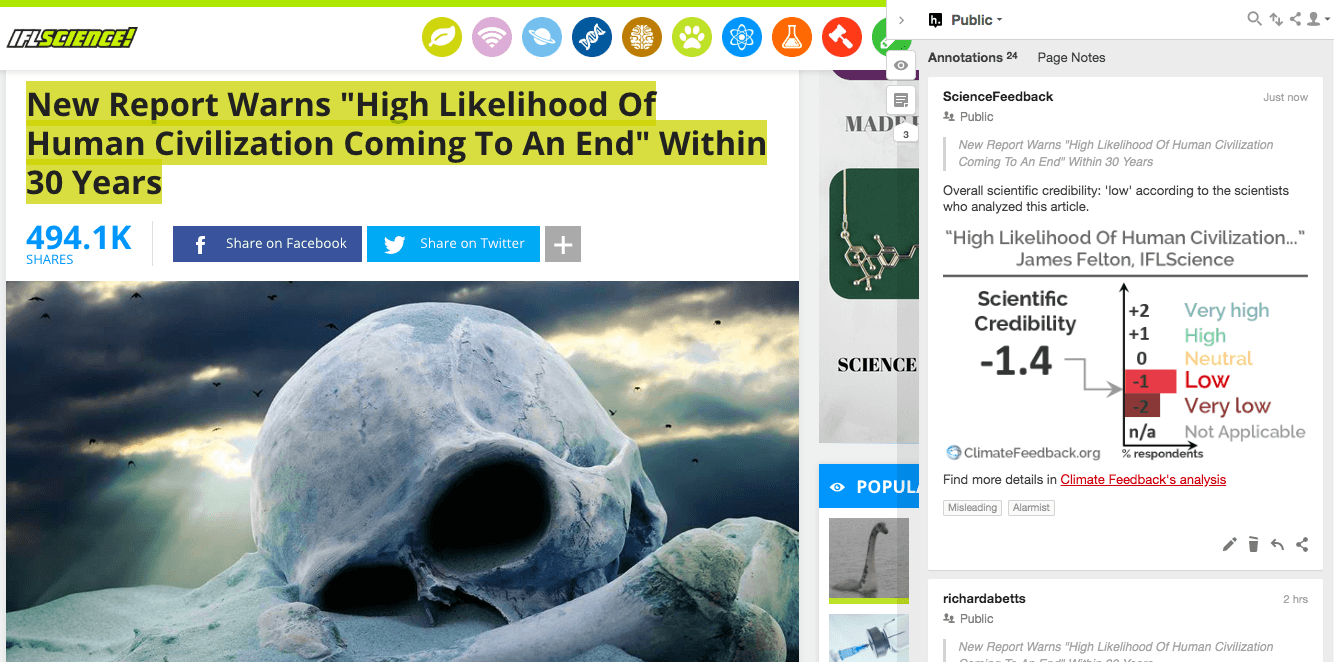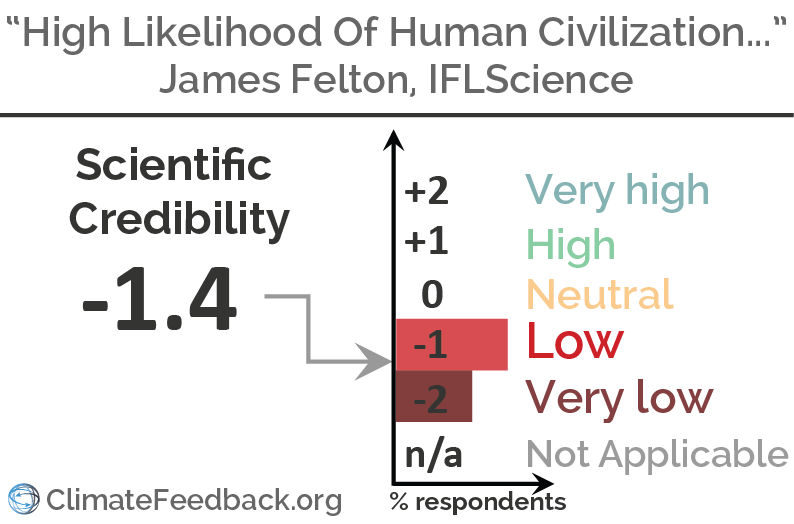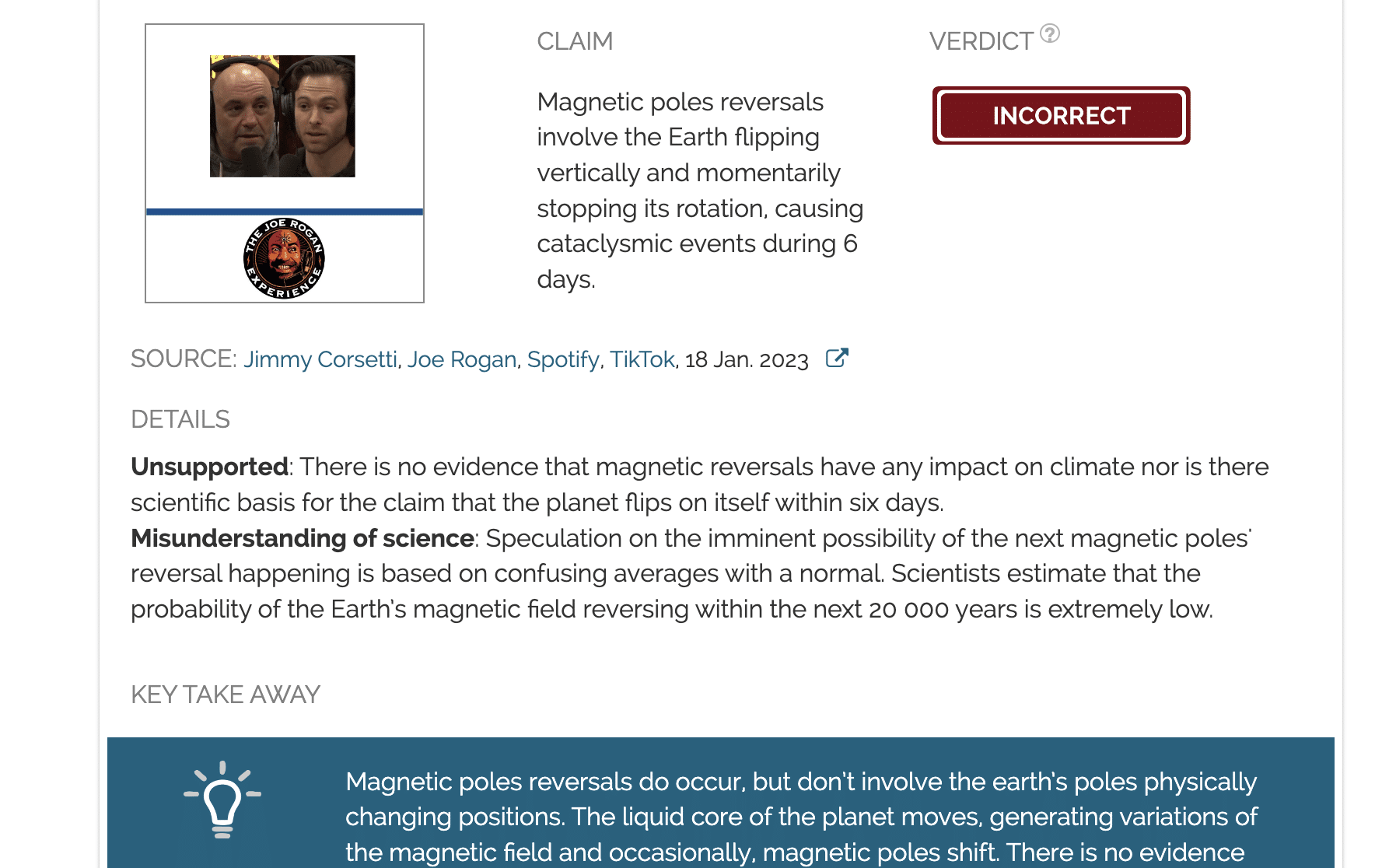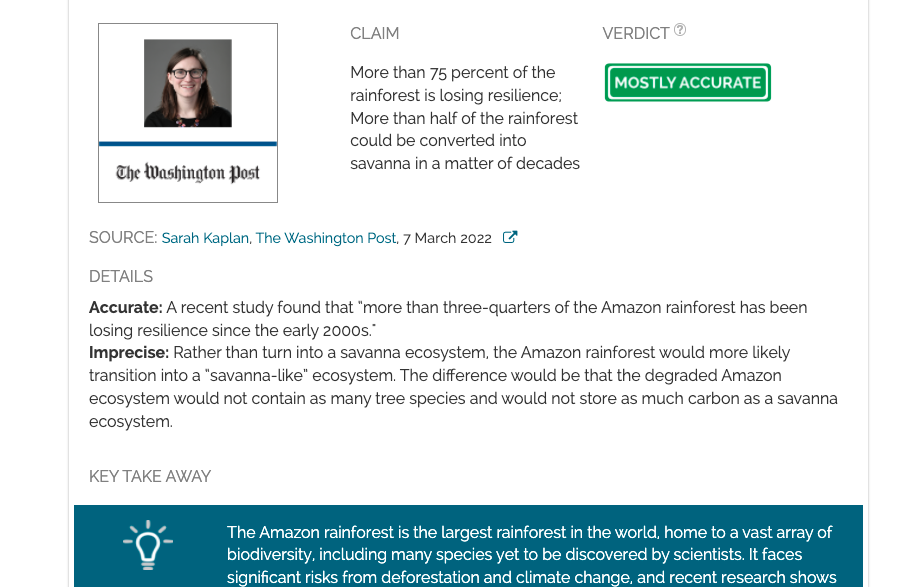- Climate
Claim that human civilization could end in 30 years is speculative, not supported with evidence
Reviewed content

Headline: "New Report Warns "High Likelihood Of Human Civilization Coming To An End" Within 30 Years"
Published in IFLScience, by James Felton, on 2019-06-04.

Scientists’ Feedback
SUMMARY
This article at IFLScience describes a report produced by an Australian think tank. The report attempts to describe a possible worst case climate scenario in 2050. The report claims this scenario leads to a “high likelihood of human civilization coming to an end”, but does not support this claim with evidence.
Scientists who reviewed IFLScience’s story found that it failed to provide sufficient context for this report—differentiating, for example, between speculative claims and descriptions of peer-reviewed research. In particular, the story’s headline (“New Report Warns ‘High Likelihood Of Human Civilization Coming To An End’ Within 30 Years”) misrepresents the report as a likely projection rather than an exploration of an intrinsically unlikely worst case scenario.
See all the scientists’ annotations in context. You can also install the Hypothesis browser extension to read the scientists’ annotations in context.
REVIEWERS’ OVERALL FEEDBACK
These comments are the overall assessment of scientists on the article, they are substantiated by their knowledge in the field and by the content of the analysis in the annotations on the article.

Researcher, Agricultural Sustainability Institute, University of California, Davis
The content of the IFLScience article is mostly an accurate representation of the contents of the Breakthrough report, but the article tends to gloss over important caveats and probabilities that are given in the report. The least accurate part of the IFLScience article is the headline, which is an outright misrepresentation of the report. The article title states that there is, overall, a “high probability” of human civilization coming to an end in 30 years. This is extremely misleading. What the Breakthrough report actually says is that, in the most unlikely, “long-tail” biophysical scenario where climate feedbacks are much more severe than we expect, THEN there is a high likelihood of human civilization coming to an end. But the report authors explicitly state that this “high-end scenario” is beyond their capacity to model or to quantitatively estimate.

Climate Scientist, University of California, Los Angeles
The article uncritically reproduces claims from a recent report released by an Australian thinktank regarding the purported “end of human civilization” due to climate change over the next 30 years. While there is plenty of scientific evidence that climate change will pose increasingly existential threats to the most vulnerable individuals in society and to key global ecosystems, even these dire outcomes aren’t equivalent to the “annihilation of intelligent life,” as is claimed in the report.

Research fellow, University of Melbourne
The report this article is based on describes a scenario which is unlikely, but several aspects of what is included in the report are likely to worsen in coming decades, such as the occurrence of deadly heatwaves. The conclusion of a high likelihood that human civilisation will end is false, although there is a great deal of evidence that there will be many damaging consequences to continued global warming over the coming decades.

Data Scientist, Jet Propulsion Laboratory
I don’t think it’s so easy to discount the essential warning of this report. However, it would have been stronger if the authors were more careful not to mention the unsupported concept of near-term human extinction, and the unsupported probabilistic claim that there is a “high likelihood” of their 2050 scenario which includes the collapse of civilization. I do not understand why non-scientist writers (neither report author is a scientist) feel a need to exaggerate sound scientific findings, when those findings are already quite alarming enough. I feel that humanity should undertake urgent climate action just as the report authors do, but I feel that misrepresenting the science is unhelpful and unnecessary.

Professor, Met Office Hadley Centre & University of Exeter
This is a classic case of a media article over-stating the conclusions and significance of a non-peer reviewed report that itself had already overstated (and indeed misrepresented) peer-reviewed science – some of which was already somewhat controversial. It appears that there was not a thorough independent check of the credibility of the message.
Notes:
[1] See the rating guidelines used for article evaluations.
[2] Each evaluation is independent. Scientists’ comments are all published at the same time.
Annotations
The statements quoted below are from the article; comments are from the reviewers (and are lightly edited for clarity).
New Report Warns “High Likelihood Of Human Civilization Coming To An End” Within 30 Years

Professor, Met Office Hadley Centre & University of Exeter
The headline overstates the conclusions of the report (which is already overdoing things). The reports says it presents a scenario, and under that scenario and all the assumptions within it, the report claims that there is a “high likelihood of human civilization coming to and end” – but even then, the report itself does not give the end of civilisation within 30 years. The process supposedly leading ultimately to collapse begins around 2050 but takes a long time to take effect. Also the processes themselves are not well-grounded in science, as they over-interpret published work.
A new report has warned there’s an existential risk to humanity from the climate crisis within the coming decades, and a ‘high likelihood of human civilization coming to an end’ over the next three decades unless urgent action is taken.

Research fellow, University of Melbourne
This is hyperbole. The scenario constructed in this report does not have a “high likelihood” of occurring in part because it requires a confluence of circumstances coming together. While it’s certainly true that climate change will be damaging to society and the environment and many of the consequences will be severe this does not equate to a high likelihood of civilisation coming to an end.

Professor, Met Office Hadley Centre & University of Exeter
The “report” is not a peer-reviewed scientific paper. It’s from some sort of “think tank” who can basically write what they like. The report itself misunderstands / misrepresents science, and does not provide traceable links to the science it is based on so it cannot easily be checked (although someone familiar with the literature can work it out, and hence see where the report’s conclusions are ramped-up from the original research).
This requires us to work towards avoiding catastrophic possibilities rather than looking at probabilities, as learning from mistakes is not an option when it comes to existential risks.

Research fellow, University of Melbourne
The report focuses on possible scenarios very much on the extreme end of what could happen but then claims there’s a “high likelihood” of human civilisation ending. These two statements don’t fit together.
With that in mind, they propose a plausible and terrifying “2050 scenario” whereby humanity could face irreversible collapse in just three decades.
Not to downplay the seriousness of what humanity is facing, but the report in fact doesn’t make this claim. While scientists do expect many of the changes to the Earth system due to global heating to be “irreversible,” and while this should be extremely concerning to any reasonable person, it is different than “irreversible human collapse” which, if you think about it, needs unpacking.
Their analysis calculates the existential climate-related security risk to Earth through a scenario set 30 years into the future.

Professor, Met Office Hadley Centre & University of Exeter
No, the report’s authors have merely read (or possibly seen without actually reading) a few of the scariest papers they could find, misunderstood (or not read properly) at least one of them, and presented unjustified statements.
posing permanent large negative consequences to humanity that may never be undone, either annihilating intelligent life or permanently and drastically curtailing its potential.

Climate Scientist, University of California, Los Angeles
As I climate scientist, I am unaware of any scientific research that suggests changes in Earth’s climate capable of “annihilating intelligent life” over the next 30 years.
There is plenty of evidence that climate change will pose increasingly existential threats to the most vulnerable individuals in society; to low-lying coastal cities and island nations; to indigenous cultures and ways of life; and to numerous plant and animal species, and perhaps even entire ecosystems.
Such consequences are well-supported by the existing evidence, are already starting to emerge in certain regions, and should be of paramount concern. But even these very dire outcomes aren’t equivalent to the “end of human civilization,” as is claimed in the report.
There is no scientific basis to suggest that climate breakdown will “annihilate intelligent life” (by which I assume the report authors mean human extinction) by 2050.
However, climate breakdown does pose a grave threat to civilization as we know it, and the potential for mass suffering on a scale perhaps never before encountered by humankind. This should be enough reason for action without any need for exaggeration or misrepresentation!
A “Hothouse Earth” scenario plays out that sees Earth’s temperatures doomed to rise by a further 1°C (1.8°F) even if we stopped emissions immediately.
This word choice perhaps reveals a bias on the part of the author of the article. A temperature can’t be doomed. And while I certainly do not encourage false optimism, assuming that humanity is doomed is lazy and counterproductive.
Fifty-five percent of the global population are subject to more than 20 days a year of lethal heat conditions beyond that which humans can survive

Professor, Met Office Hadley Centre & University of Exeter
This is clearly from Mora et al (2017) although the report does not include a citation of the paper as the source of that statement. The way it is written here (and in the report) is misleading because it gives the impression that everyone dies in those conditions. That is not actually how Mora et al define “deadly heat” – they merely looked for heatwaves when somebody died (not everybody) and then used that as the definition of a “deadly” heatwave.
North America suffers extreme weather events including wildfires, drought, and heatwaves. Monsoons in China fail, the great rivers of Asia virtually dry up, and rainfall in central America falls by half.

Research fellow, University of Melbourne
Projections of extreme events such as these are very difficult to make and vary greatly between different climate models.
Deadly heat conditions across West Africa persist for over 100 days a year
The deadly heat projections (this, and the one from the previous paragraph) come from Mora et al (2017)1.
It should be clarified that “deadly heat” here means heat and humidity beyond a two-dimension threshold where at least one person in the region subject to that heat and humidity dies (i.e., not everyone instantly dies). That said, in my opinion, the projections in Mora et al are conservative and the methods of Mora et al are sound. I did not check the claims in this report against Mora et al but I have no reason to think they are in error.
- 1- Mora et al (2017) Global risk of deadly heat, Nature Climate Change
The knock-on consequences affect national security, as the scale of the challenges involved, such as pandemic disease outbreaks, are overwhelming. Armed conflicts over resources may become a reality, and have the potential to escalate into nuclear war. In the worst case scenario, a scale of destruction the authors say is beyond their capacity to model, there is a ‘high likelihood of human civilization coming to an end’.

Postdoctoral research fellow, Potsdam Institute for Climate Impact Research
This is a highly questionable conclusion. The reference provided in the report is for the “Global Catastrophic Risks 2018” report from the “Global Challenges Foundation” and not peer-reviewed literature. (It is worth noting that this latter report also provides no peer-reviewed evidence to support this claim).
Furthermore, if it is apparently beyond our capability to model these impacts, how can they assign a ‘high likelihood’ to this outcome?
While it is true that warming of this magnitude would be catastrophic, making claims such as this without evidence serves only to undermine the trust the public will have in the science.

Climate Scientist, University of California, Los Angeles
It seems that the eye-catching headline-level claims in the report stem almost entirely from these knock-on effects, which the authors themselves admit are “beyond their capacity to model.” Thus, from a scientific perspective, the purported “high likelihood of civilization coming to an end by 2050” is essentially personal speculation on the part of the report’s authors, rather than a clear conclusion drawn from rigorous assessment of the available evidence.

Professor, Met Office Hadley Centre & University of Exeter
So there is only a “high likelihood” in the scenario that the report’s authors have constructed here. They do not say that their scenario itself is “highly likely” (in fact they say it is a “sketch”) – so the headline of this article is not justified.
The most recent IPCC report lays out a future if we limit global heating to 1.5°C instead of the Paris Agreement’s 2°C.
The article doesn’t mention it, but it’s worth pointing out that the underlying report criticizes the IPCC for being too “reticent” and gives an erroneous example: it claims that mean global temperatures will accelerate beyond the IPCC’s projections since human greenhouse gas emissions are themselves accelerating. Emissions ARE accelerating exponentially, leading to exponential CO2 atmospheric fraction increase, but exponential growth in CO2 fraction leads to linearly increasing global mean temperature.
By 2050 there’s a scientific consensus that we reached the tipping point for ice sheets in Greenland and the West Antarctic well before 2°C (3.6°F) of warming

Professor, Met Office Hadley Centre & University of Exeter
This is somewhat unclear phrasing from the report. Although studies have shown it is possible that the threshold for the Greenland Ice Sheet tipping point may be lower than 2C global warming (relative to pre-industrial), there is not currently a scientific consensus that this is where the threshold is. It seems to authors’ scenario is that scientists living in 2050 have reached the consensus that the tipping point has been passed by that time, but that’s different – again it’s part of the scenario and does not support the “end of civilisation by 2050” headline.



